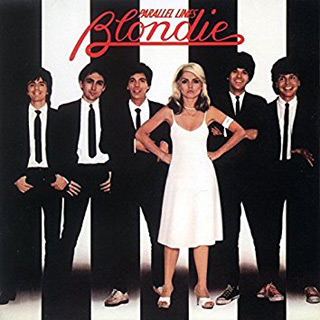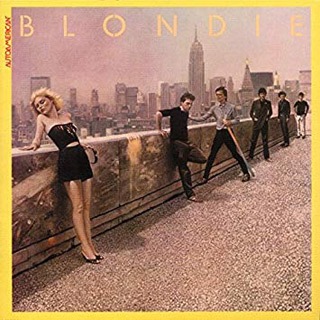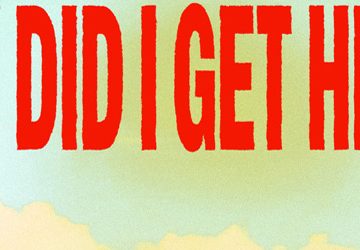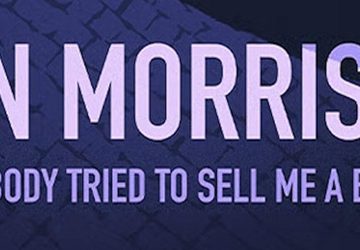 During the late 1970s, New York City was a gritty metropolis where the streets were edgy and dangerous. It was not necessarily the safest place to be, but it certainly was a fascinating time in history, and as a result, the city’s personality birthed an underground Punk Rock scene. Clubs like CBGBs, as well as Max’s Kansas City, dominated the scene while acts such as Ramones, Television, Patti Smith, and, of course, Blondie were the talk of the town. Before the age of instant media, the scene was isolated from the rest of the world, and it was one of the most revolutionary times in Rock-n-Roll.
During the late 1970s, New York City was a gritty metropolis where the streets were edgy and dangerous. It was not necessarily the safest place to be, but it certainly was a fascinating time in history, and as a result, the city’s personality birthed an underground Punk Rock scene. Clubs like CBGBs, as well as Max’s Kansas City, dominated the scene while acts such as Ramones, Television, Patti Smith, and, of course, Blondie were the talk of the town. Before the age of instant media, the scene was isolated from the rest of the world, and it was one of the most revolutionary times in Rock-n-Roll.
Blondie, founded by Singer Debbie Harry and Guitarist Chris Stein, took a unique approach to their music, and by the dawn of the 1980s, broke through to the mainstream as pioneer rockers with number 1 hits such as “Heart of Glass,” “Call Me,” “The Tide Is High,” and “Rapture.” Now considered one of the most important bands in Rock-n-Roll history, Blondie continues to build on their legacy with the release of their eleventh studio album, 2017’s Pollinator, touring, and plans for more new music in the future.
Taking the time to reflect on it all, Chris Stein recently sat down for an interview covering everything from Punk Rock to his love for photography, putting out his new book – Point of View: Me, New York City, and the Punk Scene – plus much more.
CrypticRock.com – Co-founding Blondie over four decades ago, you and the band have built a legacy as a pioneering Rock band selling multi-million albums, touring the world, and earning a place in the Rock and Roll Hall of Fame. Briefly, how would you describe this incredible journey?
Chris Stein – It certainly has been good; I wouldn’t have done anything else. I’m happy to have been able to participate in it all.
CrypticRock.com – It has to have been a blast. As an important member of Blondie, you have co-written many songs, but you also have run a record label in the past and excelled as a photographer. What inspired your interest in photography through the years?
Chris Stein – It was just always there since I was a little kid fooling around with cameras. I grew up with a guy who was a great photographer, Dennis McGuire. He was a big inspiration, he worked for Diane Arbus and was around the Warhol scene. Just in general, I wanted to be a photographer when I was a kid.


CrypticRock.com – Very fascinating. As a New Yorker, you came up during a very interesting and pivotal time in the city’s history back in the 1970s. Encapsulating that with photography, you released your new book, Point of View: Me, New York City, and the Punk Scene, on October 23rd. What was it like putting this book together?
Chris Stein – The book was interesting. It was different and a little less obvious than the first one. I had all the key shots of music, people, and such in the first book; in this one, I was trying to go for the atmosphere of the streets and what the city was like. I think it gives some kind of vibe of that.
CrypticRock.com – It certainly does. You go back 30 to 40 years; New York City was much more gritty, and you can feel that in your photography. Let’s talk about the NYC Punk scene for a minute; what was that time like?
Chris Stein – It was great. It was always very exciting and sort of isolated from everything else. We didn’t have fast media, like the way things are now. It was just by itself, cut off from the rest of the world for a few years before everyone started getting a lot of attention.
We just went to see the Anthony Bourdain’s final episode, Parts Unknown / Lower East Side. That touches on a lot of the same stuff. It is pretty great and a good picture of what the city is like.

CrypticRock.com – Very cool. That is what was exciting about Punk Rock music. As you said, it was isolated, but it felt very organic. It was not manufactured.
Chris Stein – Yeah, there was a big backlash against the super fancy musicianship that went on with bands such as ELO (Electric Light Orchestra), Chicago, etc. All these bands weren’t really represented as people and so many personalities as much as they were represented by the music.
I know people don’t use the term MRO anymore, which means middle-of-the-road, but that was a whole genre with Linda Ronstadt and the Eagles. That was what was on the radio all the time. There was a big backlash against that; everyone wanted to do gritty stuff. Everyone wanted to be able to say that you can get up there and do it if you have the right personality, even without having to have all this crazy musical ability. Classic Rock stuff was based on that. Schooling and practice are not bad things, but at the time, there was a spontaneity missing on the radio.
CrypticRock.com – Right, a lot of times it is about the feel and songwriting more than the technicality of it.
Chris Stein – Yeah, everyone was thinking about that.
CrypticRock.com – That is what gave Punk life. With Point of View: Me, New York City, and the Punk Scene out now, you also have Negative: Me, Blondie, and the Advent of Punk, which came out in 2014. With that in mind, do you have enough archived footage for another book?
Chris Stein – Possibly. I don’t know how much stuff is left. I do have enough stuff for a book from working with H.R. Giger. There is enough stuff for a book of that. I don’t know if it would be as long as these two, but there is a bunch of material.

CrypticRock.com – That would be great to see put together. Looking at your work, you have kept the images in great shape for a long time. This is prior to digital photography, so it is awesome to see how you were able to keep and archive the material.
Chris Stein – Yeah, there was some stuff that got lost over the years. There are a couple of really cool shots which I wish I still had. For the most part, I have the majority of it. It’s a pain in the ass dealing with negatives and slides. The digital stuff is much easier.
CrypticRock.com – One can imagine that there is no need to develop anything more with digital imagery nowadays.
Chris Stein – Cataloging and finding things is hard if I want to find one image. It’s really a pain in the ass looking through a million negatives and slides.
CrypticRock.com – It sounds like it can be a lot of work. Musically, things have also been very busy for Blondie. The band has toured a lot in recent years and has more dates coming up in November. You also released a fantastic new record in 2017, Pollinator. What was it like working on that album?
Chris Stein – Putting the record together was great. We worked with John Congleton; he is great. I think we are going to do another project with him. It was a lot of fun.

CrypticRock.com – That is good news! So, can we expect some new Blondie material in the coming years?
Chris Stein – I think so. It’s hard to get everybody together and write all this stuff. It’s a long process. I don’t know if putting out one song at a time like Drake does is the way to do it, but he has a million people paying attention. With our fans, we do collections.
CrypticRock.com – It is a different time. It is strange to see the way of music.
Chris Stein – Somewhat. Sometimes, if I’m in a taxi, and the guy has the radio on, everything starts to sound the same. I also hear some modern stuff I like a lot. It is what it is.
CrypticRock.com – Right, that is with any era of music. As mentioned, Blondie has toured pretty heavily in recent years. After all this time, what is it like being on the road this much?
Chris Stein – Airports kind of suck, but a lot of it is much easier than it was 20 or 30 years ago. It’s all streamlined, and all these production companies make things a lot easier. It used to be much more difficult.

CrypticRock.com – You have also earned a lot of experience on the road. That has to make it easier as well.
Chris Stein – Yea, and also, I don’t get fucked up every night. That helps, too.
CrypticRock.com – (Laughs) As you get older, things change. You learn from the past and move forward. You obviously grew up on Classic Rock. That said, what are some of your personal musical influences as a songwriter and guitarist?
Chris Stein – The usual guys like Jimi Hendrix. I think Hendrix stands up today. Some of the Classic Rock stuff I was excited about when a kid, I find I don’t have the same enthusiasm for now. Hendrix somehow really stands up because it’s such a crossover. It’s very jazzy and experimental. It’s all really gruff. You can hear him making mistakes.
When I was a kid, it was the usual suspects. I also listen to the old Blues guys too. I saw Muddy Waters a bunch of times. Bukka White was a big favorite of mine when I was a kid. Paul Butterfield was a big influence, and so was Mike Bloomfield.
CrypticRock.com – Great selections. It goes back to the human element in music that is so important. With Jimi Hendrix, you felt it; it felt human. Some recordings don’t feel so human, especially nowadays.
Chris Stein – Nowadays, it can be made very mechanically. There is a kind of laziness with the songwriting nowadays. There are so many songs that are just a series of chords – just a progression with a relatively minor chord, and you throw a vocal on top of that. Most of them are based on a chord progression, and it feels like the vocals have been semi-improvised and built around this chord progression.
When we used to write songs, we would frequently work on a melody first, and the chords would be structured around the melody. You would figure out what the chords were. It was a bit of a different process. Then again, I hear some really great stuff written in this newer style where the vocal is laid on top of this type of progression. It goes both ways.


CrypticRock.com – Yes, it is just a matter of seeking out something amidst it all. Last question. CrypticRock also covers movies, particularly Horror and Sci-Fi. If you are a fan of either genre, do you have any favorites?
Chris Stein – I am really curious about this new movie called Border from John Ajvide Lindqvist, the guy who wrote Let The Right One In (2004). I am reading the story it’s based on now. I am a big movie fanatic, I probably pay more attention to movies and TV than I do music. Lately, I think the Horror genre is really pumped up these days. I think it is partially driven by reality; everyone is fucking horrified by what is going on in the world.
I really can’t stand the Marvel movies, to me it’s watching a big cartoon at this point. The CGI is just ridiculous. Then we are in this environment when you get stuff like Get Out (2017), which is brilliant. I don’t know if that movie would have been made 20 years ago.
CrypticRock.com – Yes, and the way you feel about the superhero films is very understandable. It has become very redundant. CGI can really kill it for many people, too.
Chris Stein – The CGI does just kill it. It’s like a cartoon; I honestly feel like I am watching a cartoon. It completely takes me out of the movie and takes away from any identification I have with it. Black Panther (2017) was okay for its social elements, but it’s hard to get around some of the CGI stuff. It wasn’t as over the top as some of the Avengers things, but I stopped paying attention to that stuff at this point.








No comment